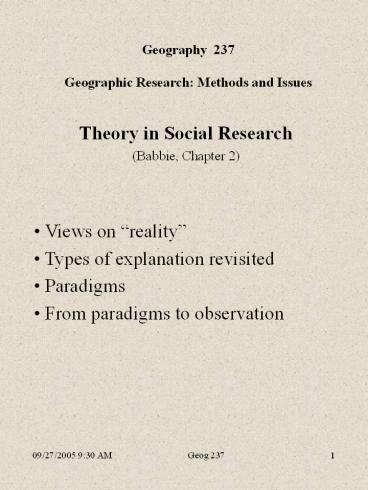Geography 237 Geographic Research: Methods and Issues - PowerPoint PPT Presentation
1 / 19
Title:
Geography 237 Geographic Research: Methods and Issues
Description:
no room for diversity of beliefs. e.g., religion and 'witches' Modern ... Avoid spurious relationships (e.g., stork population and baby population) ... – PowerPoint PPT presentation
Number of Views:73
Avg rating:3.0/5.0
Title: Geography 237 Geographic Research: Methods and Issues
1
Geography 237Geographic Research Methods and
Issues
- Theory in Social Research
- (Babbie, Chapter 2)
- Views on reality
- Types of explanation revisited
- Paradigms
- From paradigms to observation
2
Three Views on Reality
- Pre-modern
- shared beliefs single reality
- no room for diversity of beliefs
- e.g., religion and witches
- Modern
- diversity of beliefs acceptable multiple
realities - e.g., religion science
- Post-modern
- nothing is real per se only what you
experience - views of reality imposed/negotiated by groups
- no objective reality2
- e.g., geog 237 exists because we are here, it has
no independent reality
3
Formal Explanation
- Theory (repeat from last lecture)
- a set of concepts plus a characterization of
their interrelationships that, when taken
collectively explains a given phenomenon or set
of phenomena - used to make sense of/simplify the world
- more than a mere description
- Law
- An observed regularity without explanation
- types of theory (see wheel of science previous
lecture) - interpretive - formation of new concepts (usually
through induction) - formal - testable - i.e., amenable to being
stated as hypotheses that can be tested
empirically
4
ExerciseExample of Formal Theory
TestingPrejudice
- What predicts prejudice?
- http//webapp.icpsr.umich.edu/GSS/
- identify some limitations of this approach
- how would an interpretive approach to a theory of
prejudice work?
5
Three Functions of Theory
- Avoid spurious relationships (e.g., stork
population and baby population) - Suggest policy, or courses of action
- Assist future research
6
Paradigms
- Frame of reference
- Model for understanding
- Shapes what we see
- Shapes how we understand
- Resistant to change
- Social sciences unique paradigms rarely
discarded - E.g., Copernicus heliocentric universe vs
Ptolemaic model
7
Macrotheory and Microtheory
- Macrotheory
- Unit of analysis large groups society
- E.g., economic class, religion, state, Marx
- Microtheory
- Unit of analysis smaller groups, individuals
- e.g., students, middle class mothers, Mead
8
Some Paradigms in Social Science
- (Early) Positivism
- macrotheory and microtheory
- Study society using scientific methods
- Science vs metaphysics and religion
- e.g., Compte
- Social Darwinism
- macrotheory
- Finches gtgtgt society?
- Best adapted survive and procreate
- Let nature take its course?
- Typically macrotheory i.e. social evolution
- Largely "discarded
- e.g., Spencer society is getting better
9
Some Paradigms in Social Science
- Conflict Paradigm
- macrotheory (typically)
- conflict between societal groups (class, gender,
ethnicity) - oppression and domination
- ideological
- e.g., Marx
- Symbolic Interactionism
- microtheory
- social interactions, identity, shared
understandings (meanings) - taking the role of the other" - empathy
- e.g., Mead generalized other
- e.g., Cooley looking glass self
10
Some Paradigms in Social Science
- Ethnomethodology
- social structure is created not imposed
- people always "making sense" of their world
- e.g., Garfinkel
- Structural Functionalism
- macrotheory (typically)
- social systems theory
- society as organism
- functions served by phenomena
- legitimates negative "functions" - e.g.,
oppression? - e.g., Durkheim criminal punishment affirms
social values (e.g., private property)
11
Some Paradigms in Social Science
- Feminism
- macrotheory and microtheory
- white male generalized other
- challenge patriarchy/oppression of women
- emancipatory
- focus on gender
- e.g., Lever girls play
- e.g., 13 ? Geog faculty
12
Rational Objectivity in When Studying the Social
- Objectivity (traditional view)
- observer has no effect on what observed and
reported - observer merely detects reality
- Objectivity (social agreement)
- subjectivity is an individual trait, but
- subjective individuals often want to agree with
(or at least understand) others - agreement through negotiation - shared meaning
- Rationality
- those studied will usually make optimizing
choices - optimizer vs satisficer
13
RationalityAsch Experiment and Social Conformity
14
Another Take on Conformity
15
Milgram Conformity, Obedience and Authority
16
From Paradigms to Observation
- Concepts
- Building blocks of theory
- E.g., environmental equity social class
exposure to pollution - Axioms/Postulates
- Fundamental assertions about phenomena that form
the basis of theory. - E.g., all will try to avoid exposure to pollution
- E.g., upper class has more resources to avoid
pollution - Propositions
- Conclusions about how concepts fit together based
on the axioms - E.g., wealthy will use resources to avoid
pollution
17
From Paradigms to Observation
- Hypothesis
- Testable postulate.
- Use in statistical analysis
- E.g., wealthy neighbourhoods will have relatively
less pollution than poorer ones - Operationalization
- Specification of the operations for measuring
(observing) a variable - E.g, social class dwelling value (200K ),
income (80K), occupation (managerial),
education (some post graduate). - Observation
- Actual measurement
18
Exercise
- Write down three hypotheses about different
social phenomena that interest you.
19
Forms of Reasoning
- Deduction
- moves from the general to the particular
- start with theory and apply it to the real world
- e.g., evolution - applies to all species
- e.g., distance decay - applies to rents in all
cities? - Induction
- moves from the particular to the general
- start with the real world - then develop
concepts/theories based on what is observed - e.g., evolution - from finch morphology to the
theory of evolution - e.g., distance decay - from Chicago land values
in late 1960s to theory of rent distance decay
(bid-rent curves)































